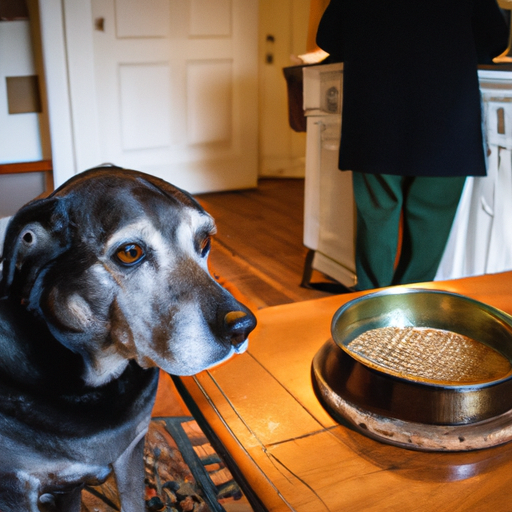It’s a common sight: the age-old companion you’ve spent years with, your loyal furry friend, suddenly loses interest in their food. This can be a concerning sign for many pet caregivers, as a dog’s appetite is often a key indicator of their overall health. When an old dog stops eating, it’s essential to understand the many factors that can contribute to this change, from medical conditions to behavioral issues.
Table of Contents
- Understanding Why Old Dogs Stop Eating
- Medical Causes
- Behavioral and Environmental Factors
- How to Encourage Eating
- When to Seek Veterinary Help
- Frequently Asked Questions
Key Takeaways
- Old dogs may stop eating due to various medical, behavioral, and environmental factors.
- Encouraging eating in elderly dogs involves identifying the underlying cause and making necessary adjustments.
- Seeking veterinary help is essential when your dog’s appetite doesn’t improve or if other worrying symptoms accompany their loss of appetite.
Understanding Why Old Dogs Stop Eating
The first step in addressing your dog’s loss of appetite is to understand the potential reasons behind it. In most cases, it’s a symptom of a larger issue and not a problem in and of itself. Depending on the cause, you may need to implement dietary changes, behavioral modifications, or even medical treatments.
Medical Causes
There are numerous medical conditions that can lead to a decreased appetite in dogs. Some of these include dental problems, kidney disease, cancer, and gastrointestinal issues. Older dogs are more susceptible to these conditions, which can explain why they might lose interest in food.
Dental Problems
Dental issues can make eating painful for your dog. If they have gum disease, loose teeth, or oral tumors, they might stop eating to avoid the discomfort. Regular dental check-ups can help prevent these problems.
This detailed guide on canine dental health offers more insights on the importance of dental care in dogs.
Kidney Disease
Kidney disease is a common ailment in older dogs, and it can cause a slew of symptoms, including loss of appetite. If your senior dog stops eating and also shows signs of increased thirst, frequent urination, or lethargy, kidney disease might be the culprit.
For more information on kidney disease in dogs, check out this comprehensive article.
Behavioral and Environmental Factors
Aside from medical issues, various behavioral and environmental factors can affect a dog’s appetite. Changes in their environment, dietary alterations, or emotional stress can all cause a dog to stop eating.
Changes in Environment
Dogs, especially older ones, thrive on routine. If there’s a significant change in their environment, it may lead to stress and a subsequent loss of appetite. This could be a move to a new home, the arrival of a new pet, or the loss of a family member.
Dietary Alterations
If you’ve recently changed your dog’s food, they might be refusing to eat because they don’t like the new diet. This article on OneTopDog provides a detailed guide on the best diet for senior dogs.
How to Encourage Eating
If your dog is refusing to eat, there are several strategies you can implement to encourage them to start eating again.
-
Warm Their Food: Warming your dog’s food can make it more appealing by enhancing its aroma. However, make sure it’s not too hot to avoid burning their mouth.
-
Add Tasty Toppers: Adding a bit of tasty, dog-safe human food to their kibble might pique their interest. This could be a bit of cooked chicken or some low-sodium broth.
-
Provide a Comfortable Eating Environment: Make sure your dog’s eating area is quiet and comfortable. This can help reduce stress and encourage eating.
When to Seek Veterinary Help
If your dog continues to refuse food despite your best efforts, it’s time to seek professional help. Sustained loss of appetite can lead to malnutrition and other serious health issues. If your dog also shows signs of lethargy, vomiting, diarrhea, or weight loss, consult your vet immediately.
Here is a helpful guide on OneTopDog on when to take your dog to the vet.
Frequently Asked Questions
1. Why is my old dog not eating but drinking water?
This could be a sign of kidney disease or diabetes. Both conditions can cause increased thirst and decreased appetite. Consult your vet if this behavior persists.
2. How long can an old dog go without eating?
While dogs can technically survive for up to five days without food, it’s a sign of a serious issue if your dog refuses to eat for more than a day. Seek veterinary help immediately.
3. Can stress cause my old dog to stop eating?
Yes, stress can cause loss of appetite in dogs. If there’s been a significant change in your dog’s environment or routine, it may be causing them stress, which can lead to eating issues.
In conclusion, when your old dog stops eating, it’s a sign that something is amiss. It’s vital to identify the underlying cause and address it appropriately. Always remember, when in doubt, consult your vet.



